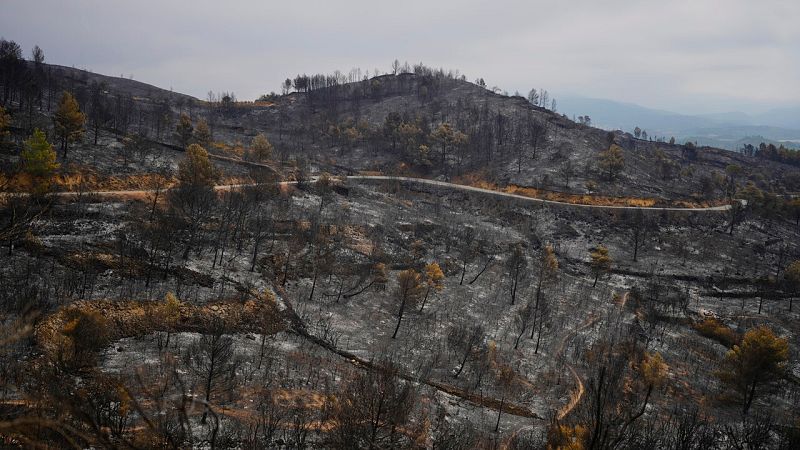Wildfires Scorch Southern Europe as Temperatures Hit New Highs

Wildfires Continue to Challenge Firefighters Across Southern Europe
Wildfires are intensifying across southern Europe as the region experiences extreme heat, with temperatures reaching record levels. Firefighters are working tirelessly to contain blazes that have caused significant damage and disruption in several countries.
In France, approximately 1,400 firefighters were deployed in the Aude region on Saturday to prevent the country's largest wildfire in decades from reigniting. The fire, which has burned over 160 square kilometers of forested land, was contained by Thursday. Residents were allowed to return to their homes, although strict restrictions remain in place regarding access to the affected areas.
Aude prefect Christian Pouget emphasized that while the fire is under control, the threat of re-ignition persists. He stated that firefighters are still monitoring “hot spots” and working to ensure the fire does not flare up again. The blaze has resulted in one fatality and 25 injuries, including 19 firefighters.
High temperatures are expected to continue, complicating firefighting efforts. Col. Christophe Magny, director of the Aude firefighters department, warned that the fire may not be fully extinguished for several weeks. Meteo France has placed the southern half of the country under a high vigilance alert for heat waves, with temperatures expected to reach up to 39°C in the Aude region.
Ongoing Fires in Spain and Greece
Firefighters in Spain are also dealing with an active wildfire in Avila province. The fire began on Friday afternoon and has been a focus of the Spanish Military Emergencies Unit (UME), which has worked through the night to bring it under control. With temperatures near 39°C in parts of Spain and Portugal, the risk of wildfires remains extremely high.
Spain’s national weather service, AEMET, forecasts that the current heatwave will persist until at least next Wednesday. In Greece, a large wildfire erupted in Keratea, about 40 kilometers southeast of Athens. The fire raged through eastern and southern Attica, causing extensive damage to homes and claiming one life. Authorities issued evacuation orders as the fire approached residential areas, and over 260 firefighters, supported by 77 vehicles, worked to contain the blaze.
Wildfires in Turkey Under Control
In Turkey, wildfires in the central districts of Canakkale and the Bayramic area have largely been brought under control, according to Agriculture and Forestry Minister Ibrahim Yumakli. Firefighting teams worked throughout the night to halt the spread of the fires, which broke out near Yigitler village and spread to forested areas under strong winds. Precautionary evacuations were carried out in several villages, with 654 residents relocated to safe zones.
Four suspects have been taken into custody as part of the ongoing investigation into the cause of the fires. Despite the progress, authorities continue to monitor the situation closely.
Climate Change and the Rise of Extreme Heat
Southern Europe has experienced multiple large wildfires this summer, highlighting the growing impact of climate change. Scientists warn that rising temperatures and prolonged dry spells are increasing the frequency and intensity of wildfires in the region.
The UN World Meteorological Organisation (WMO) released a report detailing the global impact of extreme heat. According to the report, extreme temperatures caused approximately 489,000 heat-related deaths annually between 2000 and 2019, with 36% occurring in Europe.
This July has seen record-breaking temperatures, with Turkey recording a new national high of 50.5°C. Sweden and Finland also experienced unusually long periods of temperatures above 30°C.
The WMO urges countries to act more quickly to adapt to climate change and limit global warming in line with the 2015 Paris Agreement. Ko Barrett, Deputy Secretary-General of the WMO, emphasized that extreme heat is a preventable crisis, stating, “Every single death from extreme heat is preventable.”
Efforts to scale up heat-health warning systems in 57 countries could save nearly 100,000 lives annually. Joy Shumake-Guillemot, lead of the WHO-WMO Climate and Health Joint Programme, stressed that extreme heat is not just a climate issue but a public health emergency.

Comments
Post a Comment